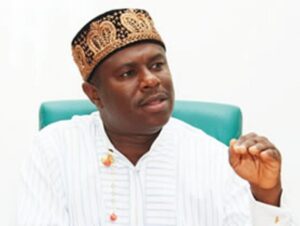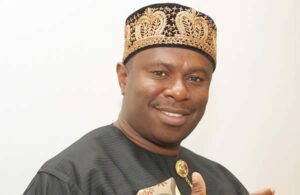
Growing helplessness of Nigerians over insecurity
By Dakuku Peterside
The impact of insecurity in Nigeria is significant, encompassing substantial losses in terms of lives, economic setbacks, and the emergence of humanitarian crises. Many citizens find themselves in precarious situations with limited access to basic needs. While this is the case, the effectiveness of the government’s response to insecurity is debatable. Some citizens feel that there is a need for decisive, prompt and coordinated action to address the root causes of insecurity and to protect communities.
Many citizens are expressing a feeling of helplessness in the face of the prevailing insecurity. The inability to go about daily activities without fear and the perception of inadequate State protection contribute to the despair. Are the institutions armed with the coercive powers of the State and charged with the maintenance of law and order failing? Are the top officials of the State running out of ideas, helpless and frustrated? This is the frightening picture the Nigerian State inadvertently painted with the infinite loop of insecurity.
Now and then, the unending circle of insurgency, banditry, kidnapping and other forms of insecurity resurfaces with greater vigour. Clearly, no challenge since Nigeria’s independence has persisted for so long like our current insecurity. The cyclic pattern seems the same. Every new government raises hope of finding a lasting solution to the challenge but, suddenly, ends in pure rhetoric or appearance of helplessness
The 2023 Christmas Eve massacre in Plateau State with unidentified gunmen overrunning about 23 local communities in Bokkos and Barkin Ladi local government areas, leaving a death toll that authorities estimated to be over 200 with more than 10,000 displaced exposed the grave vulnerability of the Nigerian State and questions her security apparatus. Ideally, the Plateau State incident was a wake-up call to ramp up intelligence and operational efficiency by the security agencies, but the agencies are not shooting for the sky . It was immediately followed by a series of successful kidnap cases in Abuja, the Federal Capital Territory. This January 2024 alone, cases of kidnappings escalated, raising concern among citizens and residents. To confirm the fears of citizens about the seeming helplessness of security agencies , at least 30 people were killed and several others injured around Mangu Town in Plateau State last week. On Saturday , soldiers and gunmen clashed in two villages of Mangu Town, leaving at least 30 dead . This is after the Governor imposed curfew in the area. There are many other undocumented kidnap cases around the country.
All these are happening at a time when the federal government has given a red alert order to the military in all 36 States of the Federation and Abuja. Sadly, involving the military in internal security to complement the Nigeria Police and other security forces has not led to much desired security of lives and property. The necessary inference to draw is, either the State is overwhelmed or adopting the wrong strategies to handle insecurity. The general impression of a State losing grip of its sovereign obligation and status with the failure of security agencies and the government to stem a descent into anarchy in spite of the efforts must be curtailed. Nigeria cannot continue to present symptoms of State security apparatus proving incompetent or overpowered by a vested interest.
When the apparatus of the State repeatedly fails the people, it is a path to a failed State. The consequence of a failed State is better imagined than experienced. When the State is overwhelmed by kidnappers, bandits and terrorists, supporting structures of growth will begin to give way. Children of school age will either not be able to attend or withdraw from school. Farmers cannot go to farms amidst escalating hunger and food inflation. Citizens’ movement within the country will be restricted out of fear and people in business cannot honour engagements. In the circumstance, poverty will quadruple and it is only a matter of time before the economy completely crumbles. Citizens would then be forced to resort to self-help and anarchy ensues.
The more considerable consequence of insecurity is that public confidence is waning. The economy is worsening as foreign investors and local operators fear for their investments. To the international community, Nigeria’s reputation as an unsafe destination erodes tourism, pushing investments to other jurisdictions and forcing citizens out. Unfortunately, the overall conduct of the State in this perilous times is still one of denial and a pretension to normalcy.
The State cannot continue to confront insecurity with the same level of thinking that created and is sustaining it. Addressing the insecurity and helplessness of Nigerian citizens requires a holistic and sustained effort from the government, civil society and the international community. It would involve immediate security measures and long-term strategies to address the root causes by building resilience within communities.
The insecurity and the sense of helplessness among Nigerian citizens is a serious concern that has far-reaching implications for the well-being of the people and national stability. For any meaningful improvement to be seen, we need a total revision of security strategies and architecture from the present state. In dealing with insecurity, governments at all levels in Nigeria must realise that it is time for citizen mobilisation and greater community engagement. Engaging local communities is very crucial in addressing insecurity. Community policing, collaboration with local leaders and fostering trust between security forces and citizens will contribute to better intelligence gathering thereby improving security.
Adequate funding, equipping, training and retraining of security forces are essential tools if Nigeria must respond to security threats effectively. There must also be deterrence to pilfering of defence or security fiscal allocations. No crime against humanity can be worse than misappropriation, diversion or misuse of funds designated for security.
Collaborating with neighbouring countries and the international community to address cross-border security threats is also essential. Countries faced with peculiar and complex challenges often seek external help. Conventional wisdom is to tap into the global reservoir of expertise and intelligence to confront debilitating internal insecurity. Shared intelligence and coordinated efforts can enhance the effectiveness of security measures. There is therefore a need for continuous collaboration among countries within the region affected by insecurity and effect a more regional, strategic approach to tackling the menace of insecurity within and outside national borders. Terrorist activities and attacks in Europe and other developed climes have receded recently due to the application of a comprehensive and continent-wide approach to tackling the problem. Terrorists’ cells across Europe were found and dismantled. The governments of European States took the war to the terrorists and were not playing catch-up with them. A preventive approach is more rewarding than a reactive approach to insecurity.
Open communication and transparency from the government regarding security is key. Citizens should be informed about measures to address insecurity, fostering a sense of participation and shared responsibility. Knowledge gives power. The more citizens are knowledgeable about the security situation and what the government is doing, the more they build trust in the government and its ability to solve security problems. The caveat is that security information should be open if it does not compromise the efforts of security agencies to deal with perpetrators of these heinous crimes.
Addressing the root causes of insecurity such as poverty, unemployment and social inequality, is very crucial. Sustainable development initiatives can help create conditions less conducive to extremist ideologies and criminal activities. The reality is that the more the economic situation in Nigeria bites, the more people are susceptible to engaging in illegal activities. Although not an excuse for crime, this fact of life makes it very expedient that all stakeholders in the Nigerian State must strive to improve the country’s economic conditions to alleviate the suffering of the majority in the interest of all. The mutual coexistence of “little beautiful roses amidst a forest of thorns”– stupendous riches of the few amidst the squalor and deprivations of the many, has been the bane of Nigeria. Both the criminals perpetuating insecurity and their victims seem to be victims and casualties of the Nigerian situation.
What we need now is for our political leaders to demonstrate strong political will to tackle insecurity. They must take tough decisions, allocate resources appropriately and hold those responsible for security lapses accountable. The time for excuses is over. The sovereign State of Nigeria must take back Nigeria and provide the most basic of State functions in the Constitution ;protecting the lives and property of its citizens. This menace of insecurity must be reduced to the barest minimum if not eradicated. I stand with the victims of insecurity in Plateau and other States in Nigeria. No one is safe until everyone is safe . It is important that the government continues to provide psychosocial support, including counselling services and community-based programmes, to help them cope with the trauma and stress caused by this unwarranted violence


